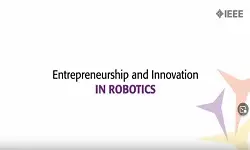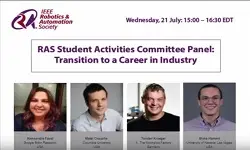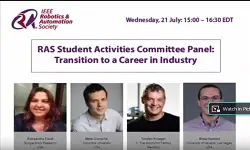-
Members: FreeRAS
IEEE Members: Free
Non-members: FreeLength: 00:24:48
01 Jun 2017
Video Description
Though the robotics market is estimated to grow at double digits till 2022, and over USD100 million was raised by robotic startups in January 2017, our study reveals that less than 5% of robotic startups last longer than 4 years, and the number is much lower for startups whose primary founders came directly from academia. The major cause leading to the closure of robotic startups is that startups failed to deliver their products to the market in a progressive and constructive manner before using up the resources, especially the monetary investment.
What is the secret code of building a startup in the robotic field, or any hardware field? How to move quickly from lab prototype to pilot production and mass manufacturing? How to effectively manage supply chain that deals with materials, components, modules, and design & manufacturing services? How to organically scale up the teams with co-founders, engineers, technicians, workers and operation staff? How to timely raise funds and get appropriate mentors’ guidance? In a nut shell, what are the essential ingredients of building a successful robotic startup?
I believe there is a secret code, or formula to run a robotic startup successfully. In this talk, I unfold the critical challenges exhibited before and during the operation of a robotic startup, and how to tackle these challenges to iteratively make prototypes, test products in the market, collect feedback, analyse and improve the product. I will use some example robotic startups residing in Songshan Lake Robotic Startup facility (Xbot Park) which I founded to illustrate the deployment of the secret code.
ICRA-X 2017
ICRA-X is an outreach activity to the general public in the region that hosts the IEEE International Conference on Robotics and Automation (ICRA) by the IEEE Robotics and Automation Society. It will feature lively presentations from distinguished experts on popular and cutting-edge topics in the field. ICRA-X is aimed at enlightening the greater community, especially the young generation.
Speaker
Zexiang Li attended South-Central University in 1978, received his BS degree in EE and Economics from CMU in 1983, then his MS degree in EECS, MA in math and PhD in EECS, all from UC Berkeley. He worked at ALCOA, CMU RI and MIT AI Lab. He was an assistant professor at NYU. In 1992, he joined the ECE Dept of HKUST. He co-founded the Automation Technology Center (ATC) and more recently the HKUST RI. Zexiang Li’s major awards include the ALCOA Foundation Fellowship, the E. Anthony Fellowship, the University Scholar award from CMU, the E.I. Jury award from UC Berkeley, and the Outstanding Young Researcher award from NSF China. He became an IEEE Fellow in 2008. Zexiang Li served as an associate editor for the IEEE TRA. He was the general Chair for ICRA’11. Zexiang Li's research areas of interest include a multi-fingered robotic hand, parallel manipulators, work piece localization and inspection, motion control, precision assembly, and UAVs. He is the author of more than 100 journal and conference papers, and the books “A Mathematical Introduction to Robotic Manipulation” (CRC Press 1993), and “Nonholonomic Motion Planning” (Kluwer 1994). Zexiang Li has co-founded several companies with his colleagues and students from the Automation Technology Center, including Googol Technology, DJI, QKM Technology, and ePropulsion. He recently co-founded the Songshan Lake Robotic Startup Center and the Clearwater Bay Venture Capital for robotic startups.
Though the robotics market is estimated to grow at double digits till 2022, and over USD100 million was raised by robotic startups in January 2017, our study reveals that less than 5% of robotic startups last longer than 4 years, and the number is much lower for startups whose primary founders came directly from academia. The major cause leading to the closure of robotic startups is that startups failed to deliver their products to the market in a progressive and constructive manner before using up the resources, especially the monetary investment.
What is the secret code of building a startup in the robotic field, or any hardware field? How to move quickly from lab prototype to pilot production and mass manufacturing? How to effectively manage supply chain that deals with materials, components, modules, and design & manufacturing services? How to organically scale up the teams with co-founders, engineers, technicians, workers and operation staff? How to timely raise funds and get appropriate mentors’ guidance? In a nut shell, what are the essential ingredients of building a successful robotic startup?
I believe there is a secret code, or formula to run a robotic startup successfully. In this talk, I unfold the critical challenges exhibited before and during the operation of a robotic startup, and how to tackle these challenges to iteratively make prototypes, test products in the market, collect feedback, analyse and improve the product. I will use some example robotic startups residing in Songshan Lake Robotic Startup facility (Xbot Park) which I founded to illustrate the deployment of the secret code.
ICRA-X 2017
ICRA-X is an outreach activity to the general public in the region that hosts the IEEE International Conference on Robotics and Automation (ICRA) by the IEEE Robotics and Automation Society. It will feature lively presentations from distinguished experts on popular and cutting-edge topics in the field. ICRA-X is aimed at enlightening the greater community, especially the young generation.
Speaker
Zexiang Li attended South-Central University in 1978, received his BS degree in EE and Economics from CMU in 1983, then his MS degree in EECS, MA in math and PhD in EECS, all from UC Berkeley. He worked at ALCOA, CMU RI and MIT AI Lab. He was an assistant professor at NYU. In 1992, he joined the ECE Dept of HKUST. He co-founded the Automation Technology Center (ATC) and more recently the HKUST RI. Zexiang Li’s major awards include the ALCOA Foundation Fellowship, the E. Anthony Fellowship, the University Scholar award from CMU, the E.I. Jury award from UC Berkeley, and the Outstanding Young Researcher award from NSF China. He became an IEEE Fellow in 2008. Zexiang Li served as an associate editor for the IEEE TRA. He was the general Chair for ICRA’11. Zexiang Li's research areas of interest include a multi-fingered robotic hand, parallel manipulators, work piece localization and inspection, motion control, precision assembly, and UAVs. He is the author of more than 100 journal and conference papers, and the books “A Mathematical Introduction to Robotic Manipulation” (CRC Press 1993), and “Nonholonomic Motion Planning” (Kluwer 1994). Zexiang Li has co-founded several companies with his colleagues and students from the Automation Technology Center, including Googol Technology, DJI, QKM Technology, and ePropulsion. He recently co-founded the Songshan Lake Robotic Startup Center and the Clearwater Bay Venture Capital for robotic startups.


